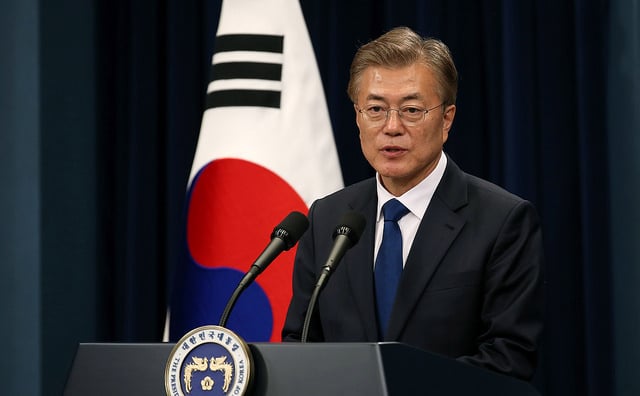
Moon Jae-in, The 19th President of the Republic of Korea. (flickr)
The Blue House’s new tenant, South Korea’s 19th President, Moon Jae-in, readily takes up his cudgels against South Korea’s ‘accumulated evils’, foregoing the tea time celebration for his overwhelming election victory.
The former senior presidential secretary for civil affairs under the Roh Moo-hyun administration unsurprisingly trounced the remaining four major candidates in the 19th presidential election. Moon overwhelmingly garnered 41% of the total votes, followed by Hong Jun-pyo (Liberal Korea Party) at 24% and Ahn Cheol-soo (People’s Party) with 21%. The conservative camp’s expert curmudgeon, Hong Jun-pyo’s impressive infighting remarkably clipped the fledgling wings of bland political amateur, Ahn Cheol-soo.
Yet his polarization strategy was not effective enough to stop swing voters’ dispersive dislodging to the scattered value niches on the political spectrum. A significant number of Korea’s non-Moon supporters cast their ballots to the major centrist right candidate, Yoo Seung-min (Bareun Party, 7%), and even to the major far-leftist candidate, Shim Sang-jung (Justice Party, 6%). This dispersive voting behavior is also attributable to the May 9 election’s 77% turnout rate, the highest in two decades.
Two weeks after his inauguration, Moon remains popular. A poll released on May 26th revealed that approximately 88% of the Korean people are confident that the liberal president will perform successfully. The record-breaking popularity trend also transferred to the new ruling party, the Democratic Party, challenger against the decade long conservative reign, which for the first time in its long opposition party career earned an approval rate higher than 50% at 51%.
Riding the tide of such a surge of public trust in the government, the new president’s focus is to dissolve the so-called ‘accumulated evils’, the corrupt and malfunctioning bureaucratic residues inherited from past military regimes’ strong statism.
The opening decisions of the “Moon Jae-in administration” (as it is officially titled) appear to have been strategically orchestrated. Some of the administration’s nominations regarding Blue House staff and the cabinet clearly conveys the message that the administration is determined to reform the two main origins of Korea’s ‘accumulated evils’: the supreme prosecutors’ office and family-owned conglomerates, or chaebols.
Corrupt precedents indicate that a number of politically greedy prosecutors at the supreme prosecutors’ office have parasitized presidential powers by neglecting their investigative neutrality in favor of the Blue House’s agendas.
The newly appointed Blue House Senior Civil Affairs Secretary, Cho Kuk, is a long devoted human rights activist and a progressive law professor with no bureaucratic background. Considering the fact that the position has generally been one of the last echelons for Korea’s prosecutors, Cho’s outsider stature is a foreboding overture that galvanizes future theatrics in the administration’s reformist campaign against the supreme prosecutors’ office.
Can the rookie with the blemish of having participated in socialist activities agreeably dismantle ossified bureaucratic mannerisms and pure-bloodism within the organization? The answer to this question will primarily be shaped by the ironically pure liberal elite’s un-value-laden rational calculation regarding the extent of reform.
The newly appointed Blue House Chief of Staff for Policy, Jang Hasung, is also a bureaucratic maverick. Nicknamed ‘chaebol (Korea’s family-owned conglomerates) sniper’, the progressive economics professor has been an ardent proponent of shareholder activism throughout his career with the People’s Solidarity for Participatory Democracy. I
n Korea, chaebols’ owner-family-directed excessive abuse of corporate power over small shareholders has increasingly been a significant obstacle to economic democratization. For example, inter-affiliate overseas trading for the top 10 conglomerates have quintupled over the past four years, further establishing the already deeply embedded circular-shareholding corporate governance structure. Such moth-eaten and corrupt corporate governance culture has nevertheless been exonerated by the public, largely because amoral families are the main breadwinners of the export-oriented economy.
The Korean people are, however, unhappy with the cyclic recurrence of this mega-‘Gap-jil’, their indignation toward it exemplified by the glaring torch of the Candlelight Revolution. Undoubtedly, ordinary Korean people will find Jang’s appointment a refreshing move.
Despite the ongoing impasse in the National Assembly concerning approval of the nominees for its cabinet members, the Moon administration has thus far successfully embellished the façade of the Blue House with a ‘cool’ yet ‘humane’ liberal reformist image. The administration is overall younger, more gender-balanced, and more region-representative, compared to the former Park administration. Most importantly, in stark difference to the Park administration, the Moon administration prioritizes effective but less formalized communication with the Korean people in its endeavors to strengthen the country’s grassroots democracy.
Nonetheless, the administration faces an onerous political challenge in terms of continuously surfing the populist tide. The president needs to skillfully survive the tsunami of Korea’s unprecedented ‘parliamentalizing’ politics. The success of his ‘cooperative governance’ in collaboration with the leviathan opposition forces in the National Assembly will largely be determined by his capability to institutionally accommodate integration throughout the country.
With the regime’s unfloundering popularity, some scholars argue that the constitutional-reforms-oriented decentralization of presidential powers should be preceded by the party-reforms-oriented decentralization of party leadership. The assumption underlying this argument is that intra-party factional hegemonism is a major problem in Korean politics and as such, congressmen, independent of their party bosses’ influence, can better-serve the public’s diverse interests.
However, what must be remembered is that unless the degree of the demand-side innovation in public services (the degree of the public’s new and evolving civil participation, as well as the vitality of their social capital) is commensurable to such decentralization of party power, the society may encounter irrational adaptive problems if the polarization of presidential powers is accompanied by un-pluralistic populism.